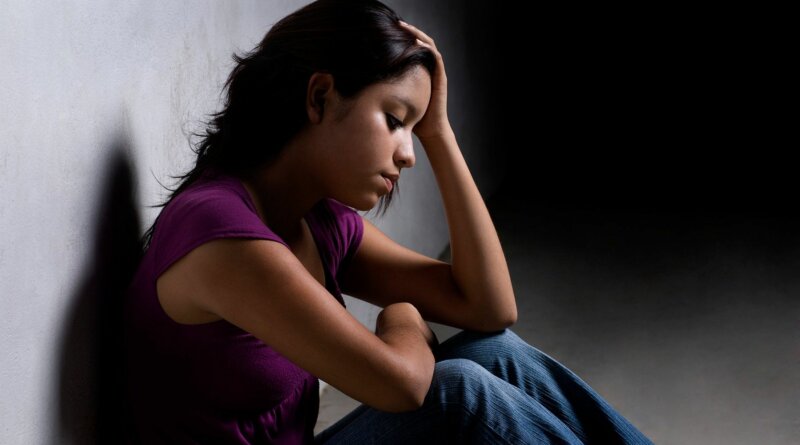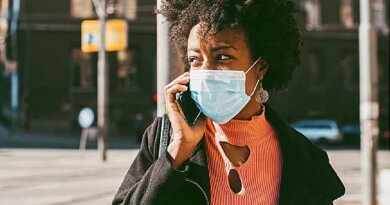As Teens Struggle With Pandemic Emotions, Recovery Is Uncertain
April 26, 2022 – For Jennifer, a 16-year-old girl from South Carolina, the lockdown phase of the COVID-19 pandemic wasn’t a big deal.
An only child, she’s close to her parents and was happy to spend more time with them when they were all stuck at home. But when Jennifer (who asked that her real name not be used due to privacy concerns) started virtual high school in 2020, she began to have depression.
“She started high school from her bedroom at a brand-new school with no friends,” says her mom, Misty Simons. “And since then, it’s been really hard for her to make friends.”
Even as society has reopened, Simons says her daughter is grappling with the emotional toll of the pandemic. Although she’s been in therapy for anxiety since the sixth grade, the isolation pushed her into depression. And that depression, she believes, “is 100% COVID.”
Jennifer’s situation is all too common as experts warn of an uptick in mental health challenges in teens across the board. It’s unclear whether the disruption of the pandemic is a blip on the radar or the early signs of a generation permanently stunted in its social and mental health development.
Teens are particularly vulnerable to loneliness as peers become more important to their social development, says Karen Rudolph, PhD, a psychology researcher focused on adolescent mental health at the University of Illinois in Champaign. Teens are relying on their friends for support, advice, and more intimate relationships while, at the same time, exerting some independence from family, she says.
“You have teens who are really focused on gaining autonomy from the family and relying more on peers. [During the pandemic,] they were forced to do the exact opposite,” says Rudolph.
The pandemic interrupted this “important normative process,” she says, in part explaining why teens may have been more lonely than other age groups during lockdowns and virtual school.
They’re also more vulnerable to the emotion of boredom, says Rudolph, which means they were more likely to be severely disappointed when they couldn’t to normal activities that pleased them. According to the CDC, a third of high school students reported poor mental health during the pandemic, and 44% said they “persistently felt sad or hopeless.”
Jennifer, an accomplished vocalist, wasn’t able to perform for more than 2 years. Her vocal classes were put on hold, erasing both her creative outlet and an avenue for making friends, says Simons.
But even though loneliness left her depressed, getting back to “normal” hasn’t been much better. Her anxiety was amplified when she returned to school and saw classmates with different attitudes toward COVID-19 precautions. “She really has had a run of it, and now she’s afraid to take her mask off,” Simons says.
‘I Worry That Re-Entry Is Going to Be Even Harder’
Ashley (not her real name due to privacy concerns) also was frightened to return to her Pennsylvania school and be around other students who were not careful about COVID-19 precautions.
She left her public school this year and enrolled at a small private Quaker school with a mask mandate and higher vaccination rates, says her mom, Jamie Beth Cohen. The family still wears masks everywhere in public and indoors, and while Ashley is sometimes embarrassed, she’s also nervous about getting sick.
“As for feeling safe again, that’s hard to say,” says Cohen. “I worry that re-entry is going to be even harder. There are friendships that have been lost due to varying degrees of risk assessment among families.”
This creates a whole new level of stress for teens who just want to feel connected again, says Rudolph. It causes a clash between wanting to conform and still feeling anxious about catching COVID-19. Maybe they had a relative or friend who got sick, or they’re concerned about their own health, she says. Either way, teens are made to feel separate, which is the last thing they need right now.
“It creates anxiety because they’re around kids who they know aren’t being careful and because they’re being made fun of for being different,” says Rudolph.
According to Andrea Hussong, PhD, a professor of psychology and neuroscience at the University of North Carolina in Chapel Hill, anxiety in teens is often part of normal development, but the recent spike in the condition is concerning. Research published last year in JAMA Pediatrics found that child and adolescent depression and anxiety had doubled over the course of the pandemic.
Ashley and her younger brother already have a lot of anxiety after two close family members were killed in a tragic shooting in 2018. The experience hit close to home, and it was difficult to shield the children from the family trauma. “They’re no longer in therapy now. But the isolation was hard,” says Cohen.
Teens rely on one another for a sense of security during times of turmoil, says Hussong. When the pandemic cut them off from each other, it made them feel like they were constantly on shaky ground.
“There’s this heightened sense of the world being an unsafe place with the pandemic as well as climate change and political tensions,” says Hussong. “When we have that sense of being unsafe, we often turn to our peers to feel safe again, and teens are getting less of that.”
Levels of anxiety and isolation are alarming but not unexpected when you consider the constraints of the past few years. Still, other more subtle social development issues could also surface, says Hussong. Teens are starting to think about social structures and how they fit in. They’re exploring their identities and their place in the world separate from their families.
“Without social interaction, teens lose one way that they use to develop self – that is social comparison,” says Hussong. “Having a positive [self] identity is linked to higher self-esteem, a clearer sense of purpose, and resilience in the face of challenge.”
Only time will tell how the disruption of the pandemic pans out for teens. On one hand, kids are resilient, and some teens, says Rudolph, may have dealt with the pandemic really well and even learned some coping skills that will help them thrive in the future. But for teens who were already at risk of social and mental health problems, the experience could negatively shape their futures.
“When teenagers experience mental health problems, it interferes with development,” says Rudolph. “Teens with depression may show declines in their ability to socially relate to others and in their academic achievement. A severe depressive episode can actually change their brains in a way that makes them more vulnerable to stress later in life.”
Jennifer’s and Ashley’s parents say they worry about the pandemic’s impact on their children’s mental health now and in the future. Simons says she is doing everything she can to get her daughter back on track.
“Phew, we are struggling,” she says. “Pandemic depression is a very real thing in our house.”




